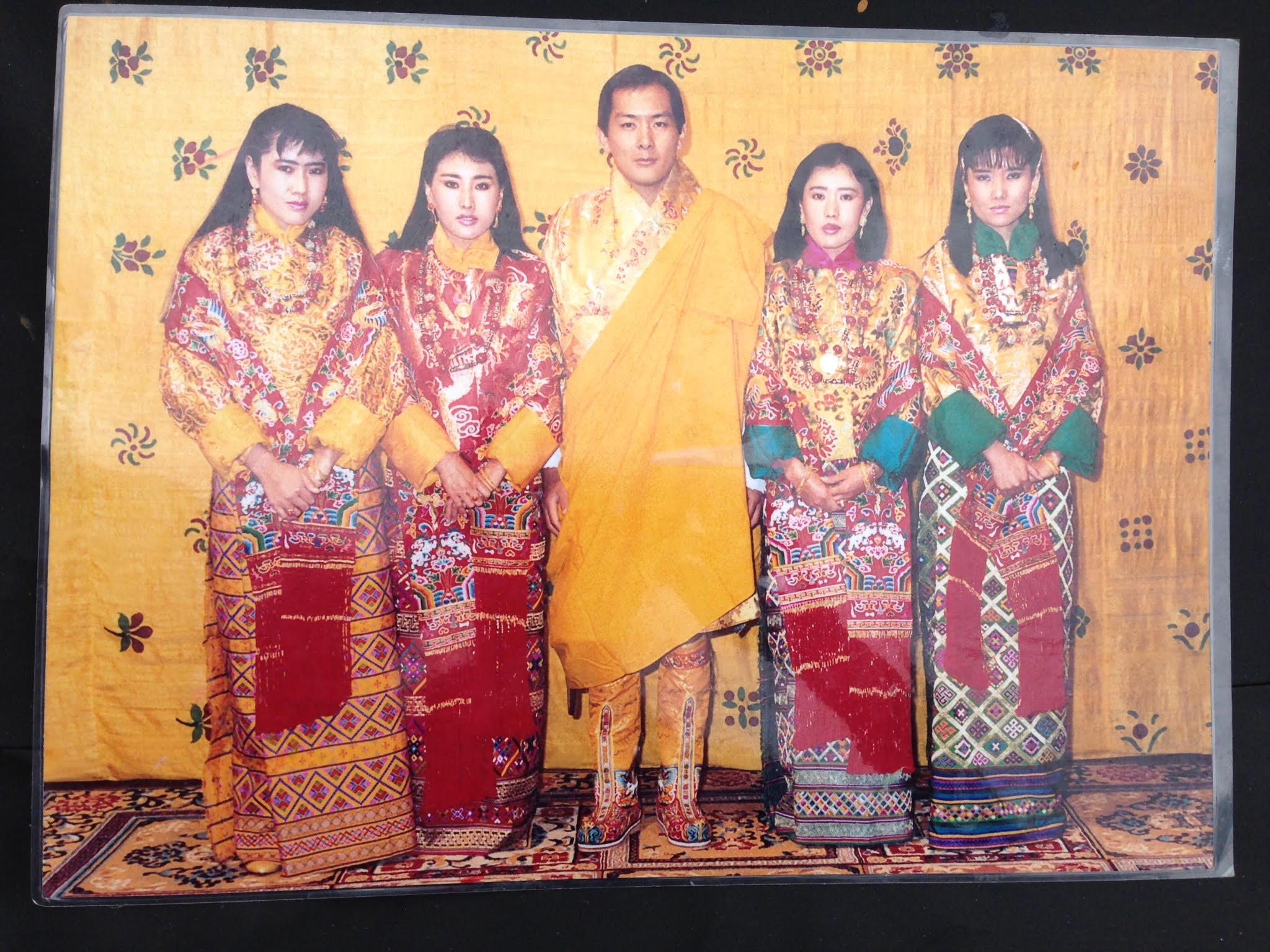How National Happiness became gross
29 August 2018The tiny kingdom of Bhutan, wedged between Tibet and India, became famous for coming up with Gross National Happiness (GNH), thanks to its king. This was not your usual king (see the photo). Before voluntarily ceding power to democratic elections, he decreed an increase in the country’s forest cover, had every child in the country learn English, and introduced Gross National Happiness.
The retired king of Bhutan with his four wives, all sisters. (Photo of a Bhutanese placemat.)
GNH resonated with people around the world who were fed up with Gross National Product (GNP). As Robert Kennedy commented:
Gross National Product counts air pollution and cigarette advertising.…It counts the destruction of the redwood…and the television programs which glorify violence.…Yet [it] does not allow for the health of our children, the quality of their education or the joy of their play.…It measures everything in short, except that which makes life worthwhile.1
GNH was based on four “pillars”: good governance, sustainable development, preservation and promotion of culture, and environmental conservation. These were elaborated in nine “domains,” which included health, education, psychological well-being, and community vitality. Simple enough.
Curious about this GNH and loving mountains, I visited Bhutan in 2006. Two things struck me in discussions with a number of the country’s knowledgeable people. First, they had no idea how to measure much of GNH; second, this didn’t much matter because the country seemed to be behaving true to its precepts. As a BBC reporter put it, GNH had become “a way of life” in Bhutan—a poor country where life seemed to be rather pleasant.
Not long after this, economists descended on Bhutan to fix GNH, even though it wasn’t broken. After all, if the Bhutanese didn’t measure GNH, how could they possibly manage it? Soon each of the nine domains had “its own weighted and unweighted GNH index…analyzed using…72 indicators.…Mathematical formulas have even been developed to reduce happiness to its tiniest component parts.”2 One survey, which took five to six hours to complete, “included about 750 variables.”3 These technocrats attended to the gross all right, but how about the happiness?
Critics of GNH have challenged its subjective judgments. “Economics professor Deirdre McCloskey criticizes such measurements as unscientific…making the analogy that society could not ‘base physics on asking people whether today was “hot, nice, or cold.”’4 If only education, culture, and happiness were as measurable as the temperature. I wonder if the greater threat to GNH has come from the enemies who want to eradicate it or the friends who want to measure it.
In 2013, not long after all this measuring, Tshering Tobgay, who had studied with economist Michael Porter at Harvard Business School, became prime minister. Soon he was claiming that GNH “distracted [some people] from the real business at hand,”5 namely “the bottom line…that we have to work harder.”6 This he could understand, in contrast to GNH, which he found “very difficult,” in fact, “complicating stuff for me.”7
F. Scott Fitzgerald claimed that “the test of a first-rate intelligence is the ability to hold two opposed ideas in mind at the same time and still retain the ability to function.”8 To any economist or prime minister who cannot handle measurement and happiness at the same time, let me suggest that you drop the measurement and celebrate the happiness.
© Henry Mintzberg 2018. To appear in “Bedtime Stories for Managers” (Berrett-Koehler, forthcoming in February 2019); a similar version appeared in this blog on 25 September 2015. Our International Masters Program for Managers (impm.org) is for those managers who can function holding two opposed ideas in mind at the same time.
Follow this TWOG on Twitter @mintzberg141, or receive the blogs directly in your inbox by subscribing here. To help disseminate these blogs, we also have a Facebook page and a LinkedIn page.
____________________________________
1 Robert F. Kennedy, “Remarks at the University of Kansas” (speech, Lawrence, KS, March 18, 1968).
2 Seth Mydans, “Recalculating Happiness in a Himalayan Kingdom,” New York Times, May 6, 2009.
3 “2010 Survey Results: Results of the Second Nationwide 2010 Survey on Gross National Happiness,” accessed August 4, 2018.
4 “ACM: Cultural Marxism: The Highest Stage of RW Brakin’ 2 Eclecpapertic Bugaboo,” Daily Kos, March 22, 2015.
5 “Bhutan’s ‘Gross National Happiness’ Masks Problems, Says New Prime Minister,” Telegraph, August 2, 2013.
6 Gardiner Harris, “Index of Happiness? Bhutan’s New Leader Prefers More Concrete Goals,” New York Times, October 4, 2013.
7 “Bhutan’s ‘Gross National Happiness’ Masks Problems.”
8 F. Scott Fitzgerald, “Part I: The Crack-Up,” Esquire, February 1936 (reprinted March 7, 2017).